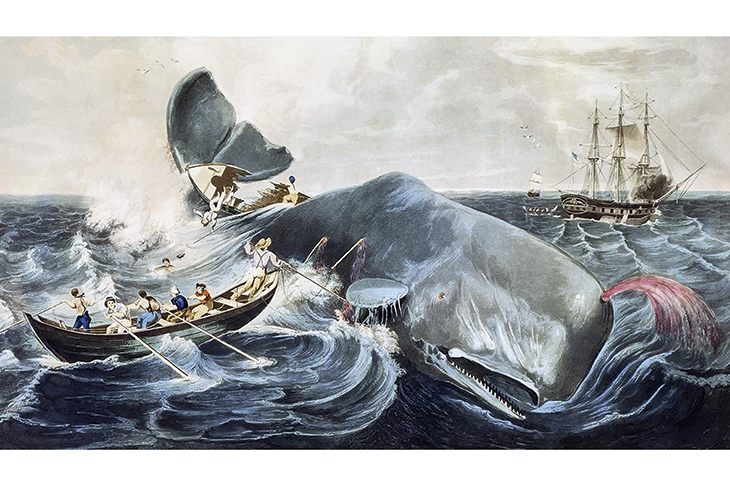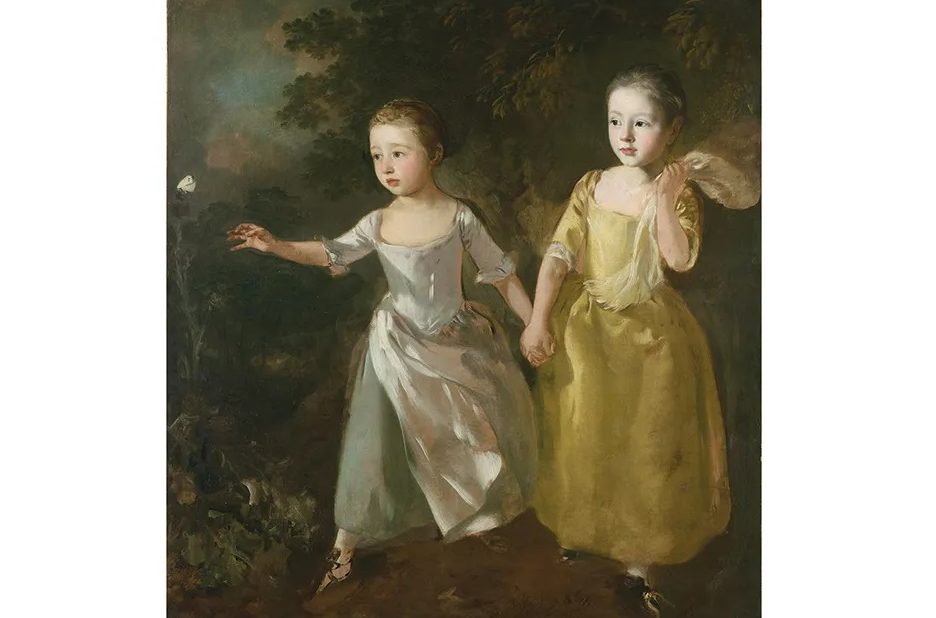Anyone who has read Moby-Dick will recognize the moment, 32 chapters in, when their line of attention, hitherto slackly paying out, snags. Having spirited us briskly through Manhattan, New Bedford and Nantucket, and having flushed Ahab from his lair on to the deck of the Pequod, Herman Melville divagates into a disquisition on whale taxonomies. In Ahab’s Rolling Sea, Richard J. King asks: ‘What happens to the story if Melville had an editor who convinced him to just cut cetology?’
Melville might have died rich and the rest of us would be all the poorer. ‘Cetology,’ writes King, lodges ‘a bone in the reader’s throat’. But, here, Ishmael is transmogrified from ‘goofy greenhand’ to ‘scholar and survivor, who has lived this world of whaling, studied ships and now has something of his own to say about it’. Thus, Moby-Dick begins its bell-bottom-like flare to the ‘digressive girth’ that would doom it commercially and condemn it to this day to be more talked about than read, yet make it talked about in the first place.
Interpreting Moby-Dick is an industry that renews itself with each generation; but the lived experience and erudition Melville poured into his masterpiece has been largely overlooked — something King aims to redress in this account of the real-life and literary inspirations behind what is sometimes scarcely recognized as ‘a novel of the sea’ amid the fixation on its higher symbolism.
Nineteenth-century whalers (and for more than two years Melville was one) were on intimate terms with their quarry, drawing up close for the kill, flensing them and ransacking their oleaginous innards. By contrast, today’s marine biologists study a now mostly protected mammal. Moby-Dick metabolizes this practical knowledge, as well as Melville’s intensive scientific reading. The result, says King, is a mythic tale that marshals poetry and science, is steeped in mariners’ lore and is also a tour-de-force of marine biology and oceanography.
What can we learn from Melville’s workup? King recovers lost resonances. Deckhand Pip becomes unglued when glimpsing, of all things, coral:
‘He saw God’s foot upon the treadle of the loom, and spoke it; and therefore his shipmates called him mad.’
King argues that Melville would have been cued to this subject by The Tempest (‘Full fathom five thy father lies; Of his bones are coral made…’). It was also grounded in his peers’ enchantment with reef formation — under the spell of ‘natural theology’, viewed as an agent of His mighty hand shaping the Earth. But if Melville was a conscientious reader of contemporary science, he was far from reverential, tweaking the academy’s solemnities and preferring the empirical grasp of ‘the man who had actually thrown the harpoon’. At the same time he was not above fudging facts for poetic effect or novelistic exigency.
When Stubb, the Pequod’s second mate, sensuously scoops a cache of fragrant ambergris from an otherwise putrescent whale carcass — ‘incorruption’ amid ‘decay’ — King catches Melville in a fisherman’s tale. This stomach matter, encasing undigested food, mellows with age to a ‘musky’ bouquet — hence its appeal to parfumiers, who also prized its property of ‘fixing’ other scents — but, fresh, it smells like you’d expect of a substance with such a provenance. (And if you didn’t already suspect it, whalers didn’t sheath themselves in whale foreskins.) Little surprise, also, that in casting Moby Dick in his singular malevolence as a worthy foe for Ahab, Melville conveniently overlooks the fact that, unless you’re tormenting them, or you’re a squid — their dietary staple — sperm whales are mostly docile.
To ‘Moby Dickheads’, Ahab’s Rolling Sea is a treasure trove. King situates Melville as a person of his time, writing amid a quickening pace of discoveries about the natural world but, pre-On the Origin of Species, inclined to couch them as further disclosures of God’s design. Still, Moby-Dick prefigures Darwin ‘by de-centering the human’. Less convincing is King’s gloss on the book as a ‘proto-environmentalist’ text, with Ahab as a stand-in for ‘Big Oil’.
Annexing Moby-Dick to contemporary pieties serves to make it relatable, but defangs and domesticates a confounding work fully in touch with its dark side, as strange as the oil-engorged Leviathan that inspired it, and, to use Yeats’s words, ‘as cold and passionate as the dawn’.
This article was originally published in The Spectator’s UK magazine. Subscribe to the US edition here.


























